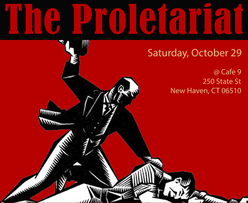 A friend tipped me off to a social justice theater/museum thing in Vermont called Bread and Puppet. Sufficiently intrigued, I decided to visit the website. There, I came across this phrase, "the radicalization of leisure." Awesome phrase if I ever heard one. So, I am now obsessed with the phrase and the idea. But I figure before I go googling or researching it I wanted to take a stab at what I think it means. Leisure, I would contrast with work. It is the time we have for ourselves when we are not busied with work. I suppose work is whatever we necessarily have to do to survive. So going to work where I get paid or cooking for my family both qualify. However, for the proletariat, leisure would mean something vastly different than it would for the capitalists or the bourgeoisie. The craftsman, the sheetmetal worker, the builder, the seller, etc., need leisure as a time to recuperate. Sustaining a working life necessitates recovery time. Leisure time as such then becomes work in that it is dictated by necessity. Thus, one's "work" and one's leisure are both determined by necessity, the difference being who dictates the necessity and for whom the products of such work benefit. In the workplace, the fruit of labor is taken by the capitalist and in work-leisure, the benefits accrue to the individual. Now, for those in a higher social location, leisure is free from the connotations of necessity. Recovery is less the issue, rather emotional rejuvenation is the focus. Free time is not bound by the necessity of bodily recovery but defined by the emphasis on freedom--this is my time to free myself from any requirements. Here is where we would see the development of a whole range of activities in which the bourgeoisie, in generating moments of freedom and satisfaction, create an entire new layer of work for the proletariat thus robbing them of their of their time. . . . How much of this is BS . . . I would say 85%. But it was a good attempt. Now, I will go research the phrase and find out what exactly it means.
0 Comments
|
AuthorOno Ekeh Archives
June 2020
Categories
All
|
 RSS Feed
RSS Feed

